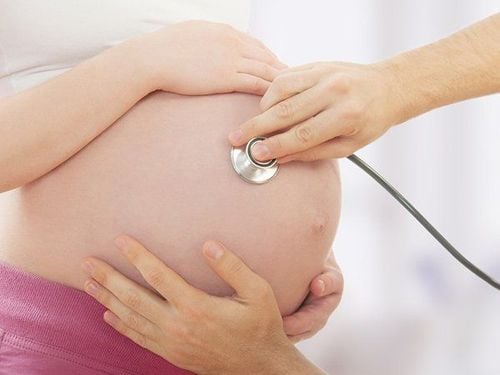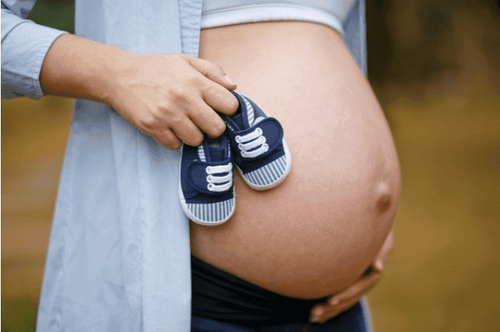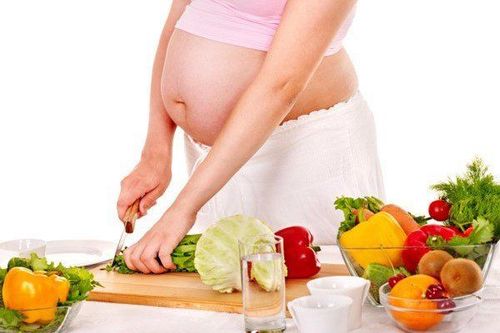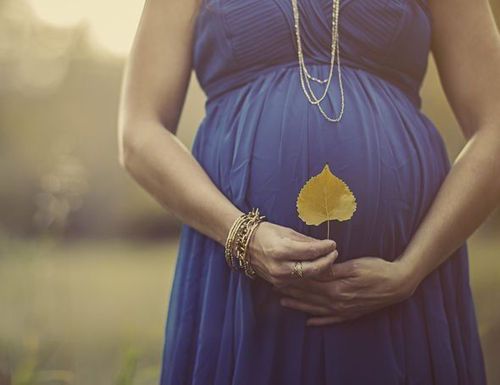This is an automatically translated article.
Professional consultation article by Doctor Department of Obstetrics and Gynecology, Vinmec Hai Phong International General Hospital.
According to obstetricians and gynecologists, too large a pregnancy is a concern for both mother and baby. The fact that pregnant women have a large baby is related to the health status of mother and baby during pregnancy and after birth.
1. What is big thai?
The average weight of a newborn baby in our country today is about 3,000 - 3,200g, heavier than in previous war years (the weight of children is only 2,800 - 3,000g). In Western countries, a newborn baby of 4,000g or more is called a large or overweight baby. In our country, obstetricians think that Vietnamese women's bodies are small, so babies over 3,500g are considered large.
In the world there is a lot of information about extremely large babies such as in Italy in 1955 there was a newborn weighing up to 10.2 kg, in Brazil in 2005 there was a newborn weighing 7.73 kg.
2. The cause of the pregnancy is too large
Folk beliefs often say that the large baby is because the mother eats a lot of nutrients, so the simple thing to prevent a large pregnancy is to limit eating to not have a caesarean section. Although the weight of the fetus depends on the mother's nutrition, if the mother is hungry during pregnancy and has poor nutrition, the result will of course be malnourished and underweight. But when the mother eats full, enough nutrients, will the baby grow larger than normal or not?
In fact, this is not the case, research statistics of the obstetrics and gynecology departments in the country as well as abroad show that: the weight of the newborn in conditions of adequate nutrition of the mother will depend on the genetic lineage transmission. For example, for Vietnamese people, the average birth weight of a baby will fluctuate around 3,200g, in addition it may depend on the following factors:
Maternal health and fitness: two mothers have The nutrition is the same, but the mother who is taller and healthier, the baby is usually bigger and stronger. The next offspring (stubble) usually has a larger weight than the previous one. Maternal illness: if the mother is obese, especially if she has diabetes, the baby's weight will definitely exceed the normal range. Therefore, when there is a baby with a high birth weight, the doctor always has to check the mother again to see if diabetes is missed. Newborns of diabetic mothers, although heavy but very weak, are very susceptible to low blood sugar right after birth and have a high mortality rate, people call these babies by the name giant, clay feet.

3. Should a large baby give birth normally?
In fact, there are still 2 kg pregnant women who can't give birth naturally, but there are still cases where 4 kg can still give birth naturally. This depends on the obstetrician's prognosis of labor. The doctor must examine the pregnancy, monitor, ask for the history, examine the mother's pelvis, predict the weight of the fetus through ultrasound, clinically estimate... a fetus over 3.5 kg is considered a large fetus.
Obstetricians in general want women to have a vaginal birth because this is best for mother and baby. But with large fetuses over 3kg, doctors usually do not force patients to give birth naturally. If the fetus weighs 4kg, it is usually indicated by caesarean section. It is not recommended to give birth naturally in these cases because of the potential risks.
4. Should you limit your diet for low birth weight?
If a mother does not have any special diseases and gives birth for the second time, should she limit her food intake to hope that the baby will be low weight and easy to give birth? The answer is no.
A pregnant woman's food is to feed both of them, so the mother naturally has to eat in larger quantities, especially in the last months, when the fetus grows rapidly in the womb. Pregnant women are often advised to eat more than 1/4 (ie 25% more) the amount of food and food than usual. Food should be diverse, including rice, meat, cooking oil, eggs, milk, fish, shrimp, vegetables, should not abstain from any food if you like to eat.
If pregnant women limit their food intake, the first harm is that the health of the pregnant woman is not guaranteed, childbirth will be difficult, after giving birth, there will not be enough milk to feed the baby. On the part of the child, the fetus will be malnourished right from the womb, should not be assumed that the mother will give birth easily because the fetus is weak, so it is easy to fail during labor. , resulting in doctors having to intervene to avoid complications for both mother and child, including having to have a caesarean section to save the fetus.
5. Thai is too big, what's wrong?

The risk for pregnant women is too great:
Increased risk of sudden fetal death, obstetric trauma at birth, postpartum haemorrhage, infection after surgery, postpartum. The risk later is type 2 diabetes, chronic hypertension. Risk for babies weighing more than 4000 grams at birth. Do not be subjective with the baby when seeing the good health status after birth. It is necessary to closely monitor the child's development about:
Postnatal lung disease, the risk of respiratory failure. Obesity risk. Postpartum metabolic disorders.
6. Thai is too big what to do?
When the mother gains a lot of weight and the fetus is large, it should be noted:
Before giving birth, it is necessary to have regular antenatal check-ups and closely monitor the health of mother and baby. Monitor blood sugar, blood pressure, measure fetal heart rate, signs such as edema, hypertension, urine test. Need to go to the hospital immediately when headache, dizziness, dizziness, weight gain of more than 1kg / 1 week. Diet: eat a lot of vegetables, limit eating a lot of sugar and starch, do light exercise. Need to see a Cardiologist 3 weeks after birth and an Endocrinologist 4-6 weeks after giving birth. The second trimester of pregnancy is a period of strong fetal development. Pregnant women need:
Comprehensive fetal malformation screening by superior 4D ultrasound technique. Screening for gestational diabetes, avoiding many dangerous complications for both mother and baby. Control the mother's weight reasonably to assess the health status of the pregnant woman and the development of the fetus. Understand the signs of threatened early delivery (especially in those carrying multiple pregnancies or having a history of miscarriage or premature birth) so that they can receive timely treatment to maintain pregnancy. To protect mother and baby during pregnancy, Vinmec provides a comprehensive Maternity service to monitor the health status of mother and baby, periodical antenatal check-ups with leading Obstetricians and Gynecologists. enough tests, important screening for pregnant women, counseling and timely intervention when detecting abnormalities in the health of mother and baby.
Please dial HOTLINE for more information or register for an appointment HERE. Download MyVinmec app to make appointments faster and to manage your bookings easily.













